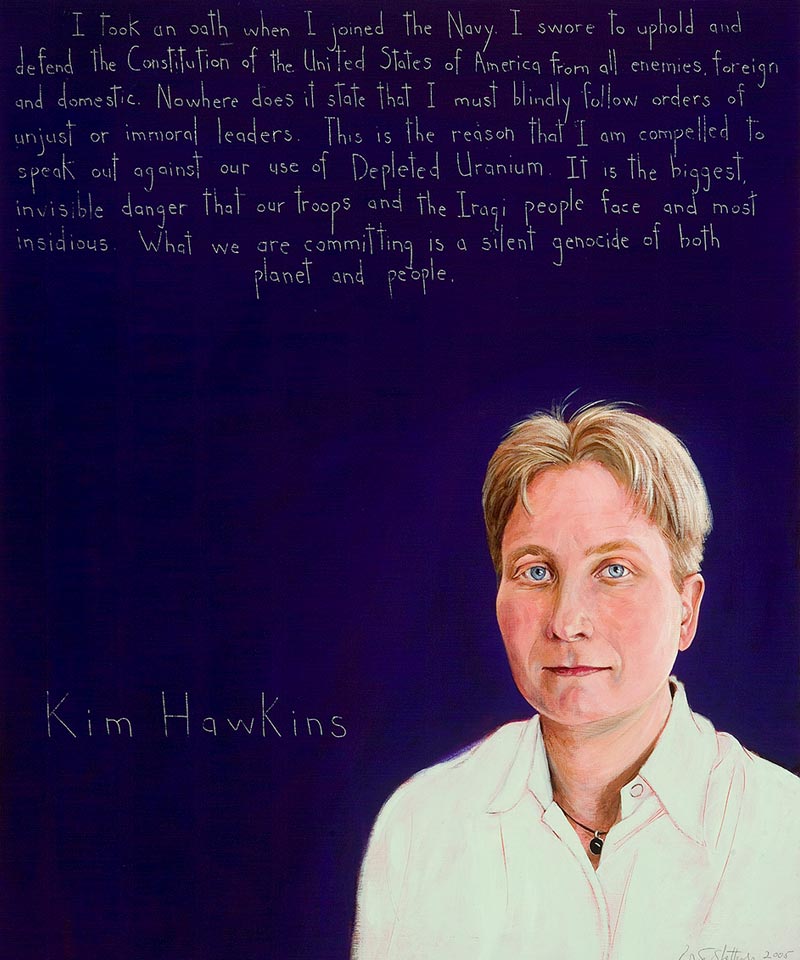
Kim Hawkins
Gulf War Veteran, Artist : b. 1963
“I took an oath when I joined the Navy. I swore to uphold and defend the Constitution of the United States of America from all enemies, foreign and domestic. Nowhere does it state that I must blindly follow the orders of unjust or immoral leaders. This is the reason that I am compelled to speak out against our use of Depleted Uranium. It is the biggest, invisible danger that our troops and the Iraqi people face and most insidious. What we are committing is a silent genocide of both planet and people.”
Biography
Kim Hawkins was a budding, twenty-five-year-old artist, living in New York City with no money, when she joined the Navy. “I think we’ve been fighting ever since we stepped off the Mayflower,” she says of her family’s military history. She worked in aviation hydraulics, serving stateside. In 1990, days before Hawkins was to be discharged, she made an ill-advised comment about a rape case in which the offender was given a light penalty. Her tour was extended, and she was sent to the Persian Gulf, and eventually reassigned to the hospital ship, USNS Mercy.
Seeing injured Gulf War troops flown in, many of them casualties of “friendly fire,” opened Hawkins’s awareness of how cruel war is to those who fight. “If you’ve ever thought about going to war at all, you need to go to a V.A. hospital and take a look,” she says. Years later, Hawkins began noticing that the casualties continued even after the fighting stopped. “I was hardly more than thirty years old, and already I’d lost seven or eight [veteran] friends to cancer,” says Hawkins.
She and other Gulf War vets started searching for the reasons for the high cancer statistics among veterans. “It was such an alphabet soup of exposures,” she says, citing chemical weapons that were blown up, burning oil wells, and radiation from depleted uranium (DU) missiles. Made from a cheap byproduct of nuclear energy, DU weapons can penetrate just about anything—and then release billions of radioactive dust particles. The results of dropping hundreds of tons of DU during the Gulf War, says Hawkins, included skyrocketing rates of birth defects and cancer among Iraqi children, a 67 percent birth-defect rate among children of Gulf War vets, and elevated rates of cervical and uterine cancer among vets’ wives—not to mention the cancer and other mysterious ailments among veterans. (In the Iraq War, thousands of tons of DU were used.)
Suicide also runs higher among vets, due in part to post-traumatic stress syndrome (PTSD). Hawkins was diagnosed with PTSD well after the war and endured four years of excruciating treatment. In all, she says, the Government Accounting Office reports that 400,000 of the 600,000 troops who served in the Gulf War have received treatment for diseases and disorders.
Hawkins now speaks wherever she can about hazards of war duty that recruiters don’t mention. “I’m certainly not trying to scare people,” she says. “But if I can spare someone going through some of the experiences I’ve gone through, then that would be a good thing.”
Programs
Americans Who Tell the Truth (AWTT) offers a variety of ways to engage with its portraits and portrait subjects. Host an exhibit, use our free lesson plans and educational programs, or engage with a member of the AWTT team or portrait subjects.

Education
AWTT has educational materials and lesson plans that ask students to grapple with truth, justice, and freedom.

Exhibits & Community Engagement
AWTT encourages community engagement programs and exhibits accompanied by public events that stimulate dialogue around citizenship, education, and activism.